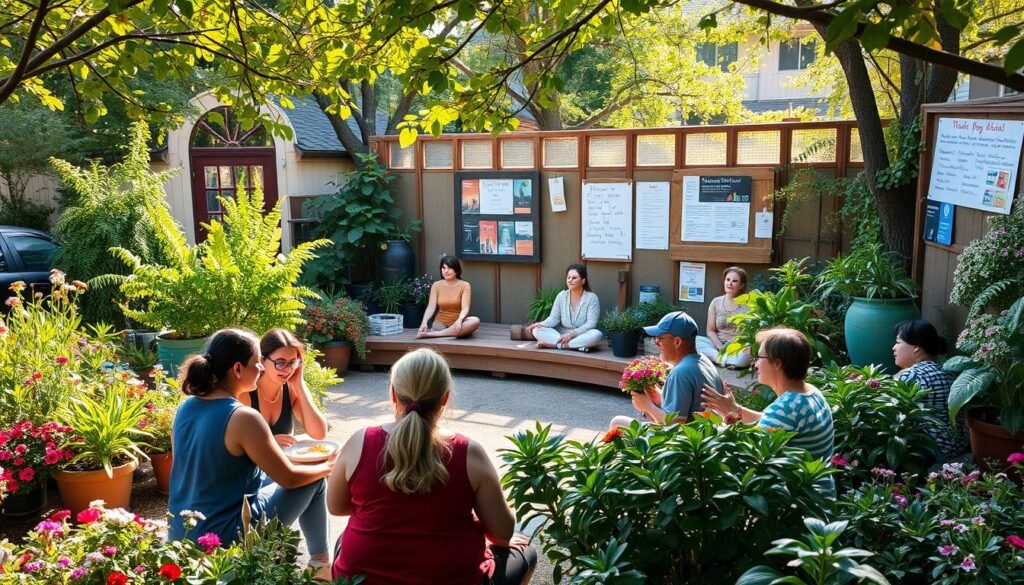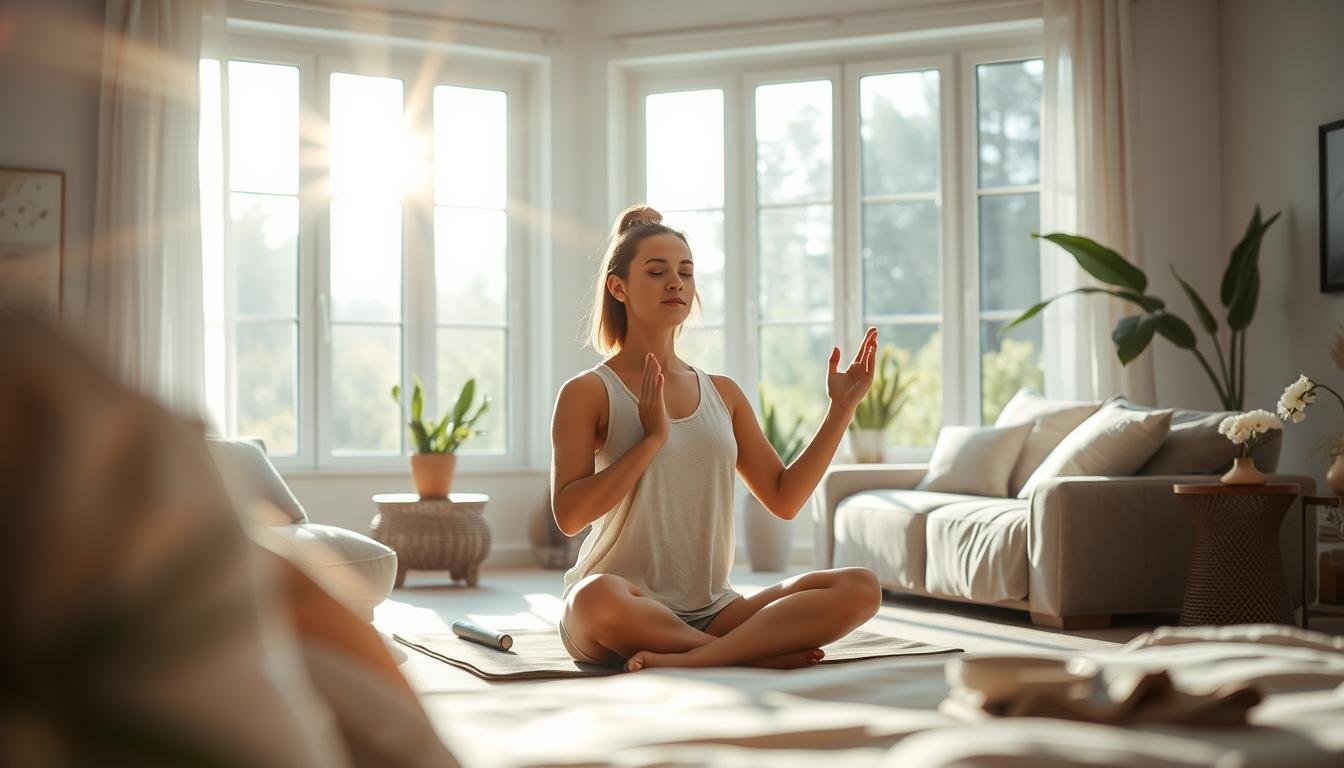Modern life is full of stress, endless screens, and never-ending tasks. Yet, research shows that taking care of yourself is not a luxury. It’s the key to thriving. This article will show how small self-care steps can help you regain energy, focus, and joy in today’s fast-paced world.
Self-care isn’t about making big gestures. It’s about making small, consistent choices. By focusing on your mind, body, and spirit, you can fight burnout and build lasting strength. Learn why small, daily routines are more important than big, occasional treats.
Key Takeaways
- Even 5 minutes of daily mindfulness reduces stress and improves focus.
- A balanced self-care lifestyle prevents health risks linked to chronic stress.
- Ignoring emotional needs weakens physical and mental performance over time.
- Small habits like hydration or walking breaks count as meaningful self-care.
- Self-care tips adapt to anyone’s schedule, not just “perfect” routines.
Understanding the Concept of Self-Care
Self-care is not a luxury; it’s essential for wellness and self improvement. It means taking steps to keep yourself healthy, covering physical, mental, and emotional areas. It’s more than just relaxing; it’s about living a balanced life.
What is Self-Care?
Self-care is about doing things that keep you well. The American Psychological Association says it cuts stress by 30%, making daily life better. It includes things like getting enough sleep, eating right, and checking in with your feelings and friends.
Types of Self-Care
There are different types of self-care that help you stay strong. Here are a few:
| Type | Examples |
|---|---|
| Physical | Exercise, hydration |
| Mental | Reading, puzzles |
| Emotional | Therapy, journaling |
| Social | Support groups, friendship |
| Spiritual | Meditation, nature walks |
Importance of Self-Care
“Ignoring self-care leads to burnout faster than any other choice.”
Studies show that focusing on self-care can make you 25% more productive and boost your immune system. It also helps avoid chronic stress, which can harm your heart. By making self-care a part of your life, you build lasting strength and personal growth.
Mental Self-Care Practices
Mental self-care boosts your mind’s strength and emotional balance. Activities like mindfulness and journaling help your mental health. They cut down stress and improve focus. Studies prove that mindfulness lowers anxiety and sharpens your awareness.
Mindfulness and Meditation
Start with short guided sessions or body scans to stay present. You can try:
- 10-minute breathing exercises
- Walking meditations
- Body scan visualizations
Regular practice creates pathways in your brain. These calm your mind and help you manage emotions better.
Journaling for Clarity
Writing down your thoughts clears your mind and reduces mental mess. Try these ideas:
- Track daily highs and lows
- Describe challenges without judgment
- Brainstorm solutions for recurring stressors
Journaling regularly sharpens your problem-solving skills. It also helps you be kinder to yourself.
The Role of Creativity
Being creative lowers stress hormones like cortisol. Activities like painting, music, or poetry use parts of your brain you don’t use often:
- Sketching to process emotions
- Writing free-form poetry
- Playing an instrument to boost dopamine levels
Just 15 minutes a day of creative work can lift your mood and make your mind more flexible.
Physical Self-Care Routines
Physical self-care makes your body strong and clears your mind. It’s key to lasting wellness. Small, regular steps lead to lasting healthy habits that boost energy and strength.
Exercise and Movement
Moving around lifts your mood and cuts down stress. You can start with short walks, yoga, or strength training. Mix it up to keep things interesting.
- Walk briskly during breaks.
- Try dance-based workouts for cardio and fun.
- Incorporate stretching to improve flexibility.
Nutrition and Hydration
Eat foods full of nutrients like veggies, lean meats, and whole grains. Drinking water helps your body work right. Don’t go on extreme diets. Instead, eat mindfully to listen to your body’s hunger.
Sleep Hygiene
Good sleep needs a regular bedtime. Use dark curtains and avoid screens before bed. A calming pre-sleep routine, like reading or meditation, helps you relax.
These habits together build healthy habits that boost your immune system and focus. Make them a top priority for your wellness journey.
Emotional Self-Care Strategies
Emotional self-care boosts mental health and personal development. It helps build emotional strength. Begin by learning about your feelings with tools like emotion wheels or journals. This helps you understand and deal with emotions without judging yourself.

Identifying Your Emotions
Here’s how to recognize your emotions:
- Stop and notice how your body feels (like tension or warmth)
- Use specific words like “frustrated” instead of “upset”
- Think, “What need is this feeling showing?”
Building Healthy Relationships
Surround yourself with people who support your feelings. Watch out for signs of unhealthy relationships, like constant criticism or feeling drained. Good relationships are based on respect and open talk.
Setting Boundaries
Setting limits is key for mental health. Say, “I need to focus on myself” when you can’t do something. Keeping boundaries helps you feel confident and less stressed.
Emotional awareness turns inner chaos into clarity, empowering growth through self-compassion.
Spiritual Self-Care Techniques
Spiritual self-care adds depth to your self-care routine. It helps you find purpose and connect with something bigger than daily life. This approach aligns your actions with your values, making you stronger when faced with challenges.
Finding Your Spiritual Path
Starting your spiritual journey means reflecting on your values. Ask yourself: What guides my choices? What kind of legacy do I want to leave? You might explore yoga, prayer, or secular humanism to find your way.
Many people find their path through reading philosophy or attending cultural events. These experiences can bring clarity and direction.
Engaging with Nature
Studies show that nature is good for your spirit. Simple acts like walking or gardening can reconnect you to the world. Even city folks can find peace by gardening indoors or visiting parks.
Practices for Inner Peace
Practices like mindfulness meditation, tai chi, or prayer can calm your mind. Here are some tips:
- Take 10 minutes each day for deep breathing
- Try guided visualizations with light or soothing sounds
- Keep a gratitude journal to focus on the good things
“Nature does not hurry, yet everything is accomplished.” — Lao Tzu
By adding these practices to your routine, you can grow spiritually. This enriches your self-care lifestyle, helping you live with purpose and balance.
The Importance of Balance
Balance is key to lasting wellness. A good self-care routine should fit into your life smoothly. Here’s how to make it a part of your daily routine:
Integrating Self-Care into Daily Life
Small, consistent actions build lasting habits. Try these steps:
- Add 5 minutes of deep breathing to your morning routine.
- Pair work breaks with short walks or stretching.
- End days with a gratitude reflection to close the cycle.
Avoiding Burnout
“Burnout results from prolonged stress exceeding one’s coping abilities.”
Signs include constant exhaustion, irritability, or detachment. Prevent this by:
- Checking in weekly with mood journals or apps like Daylio.
- Scheduling 10-minute movement breaks every 90 minutes.
- Learning to say “no” to non-essential tasks.
Evaluating Your Needs
| Questions to Ask | Why It Matters |
|---|---|
| When do I feel most energized? | Identifies activities to prioritize |
| What daily stressors feel unmanageable? | Targets areas needing adjustment |
| How has my schedule changed this month? | Encourages flexibility |
Wellness changes over time—so should your routine. Update your practices monthly to keep up with life’s changes. Balance isn’t about being perfect; it’s about making intentional adjustments.
Creating a Self-Care Plan
Turning self-care ideas into action starts with a clear plan. Good self improvement happens when goals fit into your daily life. Follow these steps to make a plan that boosts your well-being every day.
Setting Realistic Goals
Use the SMART framework to make goals you can reach:
- Specific: “I’ll meditate 5 minutes daily at 7 AM.” (Not just “Meditate more”)
- Measurable: Use a fitness app to track steps.
- Attainable: Pick goals that fit your schedule, like 20-minute walks.
- Relevant: Focus on tasks like journaling if you want to manage stress.
- Time-bound: Try to write in a gratitude journal every evening by 8 PM.
Prioritizing Your Well-Being
Self-care isn’t selfish—it’s essential for keeping energy and focus.
Don’t feel guilty about self-care. Treat it like a work meeting. Focus on progress, not perfection. Even small steps, like a 10-minute walk, matter.
Use reminders to take breaks during busy days. It helps you stay focused and calm.
Tracking Your Progress
| Method | Pros | Cons | Ideal For |
|---|---|---|---|
| Journaling | Personal reflection | Time-consuming | Emotional tracking |
| Apps | Automated reminders | Screen time | Physical activity goals |
| Checklists | Visual progress | Rigid structure | Weekly routines |
Check your self-care tips every month. Change goals if they feel too hard. Celebrate when you stick to a routine for 21 days.
The Role of Community in Self-Care
Self-care grows stronger when we share it. Personal development and a self-care lifestyle become richer with the help of others. Communities bring resources and views that we can’t find alone.

Building Support Networks
Strong bonds are key to staying strong. Look for groups or people who:
- Emotional support through listening and understanding
- Practical help for everyday problems
- Informational guidance on new ways to cope
Sharing Experiences with Others
Being open with trusted friends can turn hard times into learning moments.
“Alone we can do so little; together we can do so much.” — Helen Keller
Support groups or simple chats show us that caring for ourselves is a shared value.
Volunteering and Giving Back
Helping others can make us feel better. A 2022 study by the University of Michigan showed volunteers are 40% less likely to feel depressed. Helping others gives us a sense of purpose, which is key to personal development and a lasting self-care lifestyle.
Overcoming Barriers to Self-Care
Life’s demands can make it hard to keep up a self-care routine. Time, guilt, and what others think can get in the way. But, these barriers can be overcome. Here’s how:
Time Management Tips
- Time-block micro-sessions: Plan 5-10 minute breaks for breathing or stretching in your day.
- Use the “unschedule” method: Begin with an empty calendar and fill it with self-care activities.
- Identify time drains: Look at your daily routines to find 30 minutes a week for healthy habits.
Addressing Guilt and Shame
“Self-care is not selfish—it’s essential.”
Challenge the idea that self-care is a luxury. Write affirmations like, “I deserve rest” to fight guilt. See how small actions, like a 10-minute walk, help you help others.
Making Self-Care a Priority
- Link self-care to daily habits: Meditate while you have your morning coffee.
- Share your goals with a friend to stay on track.
- Reflect on your core values each week to remember why self-care is important.
Small changes can lead to big progress. Begin with one step today. Your well-being is worth it.
Self-Care Across Different Life Stages
As we grow, our needs for self-care change. It’s important to adjust our habits to fit our age. This way, we can keep up with our changing lives.
- Weekly budgeting sessions to reduce money stress
- Short daily meditation to manage work pressures
- Joining hobby groups to build social connections
Parents juggling work and family life might find:
- 10-minute mindfulness breaks during child naps
- Family yoga sessions to bond and relax together
- Parent support groups for shared wellness strategies
Seniors can stay well by:
- Chair yoga to improve mobility
- Volunteering for purposeful engagement
- Cognitive games to support brain health
| Life Stage | Key Wellness Strategies |
|---|---|
| Young Adults | Budgeting, mindfulness, social groups |
| Parents | Shared activities, time management |
| Seniors | Adaptive exercise, cognitive stimulation |
“Self-care isn’t one-size-fits-all—it’s a lifelong journey of adaptation,” says Dr. Emily Carter, geriatric wellness specialist.
Adjusting our self-care habits helps us stay well at every stage of life. Making small changes regularly helps us find balance. This is key as our responsibilities and abilities change.
Embracing Self-Care as a Lifestyle
Self-care isn’t just a list to check off. It’s a daily choice that shapes our well-being over time. By adding these practices to our routines, we build resilience and grow. Small, consistent efforts lead to lasting change.
Long-Term Benefits of Self-Care
Studies show that regular self-care lowers stress hormones and boosts immunity. Over time, this reduces the risk of chronic diseases like heart disease. Improved mental health, such as less anxiety and better emotional control, becomes clear.
By focusing on sleep, nutrition, and mindfulness today, we plant seeds for a healthier future.
Cultivating a Positive Mindset
A growth mindset turns self-care into a lifelong journey. Seeing challenges as chances for growth, like adjusting routines after setbacks, encourages us to keep going. Practices like gratitude journaling or positive affirmations change our thinking, keeping us committed.
This mindset shift turns obstacles into tools for growth.
Celebrating Your Progress
Use apps like Daylio or a simple diary to track your progress. Celebrate finishing a meditation streak or cooking healthy meals. Sharing successes with a support group boosts motivation.
Even small wins, like taking a walk during a busy day, are worth celebrating. They show our dedication to well-being.
Start today. Take one small step: a 10-minute walk, a page in a journal, or setting a boundary. Every effort helps nurture our mind, body, and spirit. Self-care isn’t selfish—it’s essential. Choose practices that meet your needs, and watch how consistent care improves your mental health and personal growth over time.



